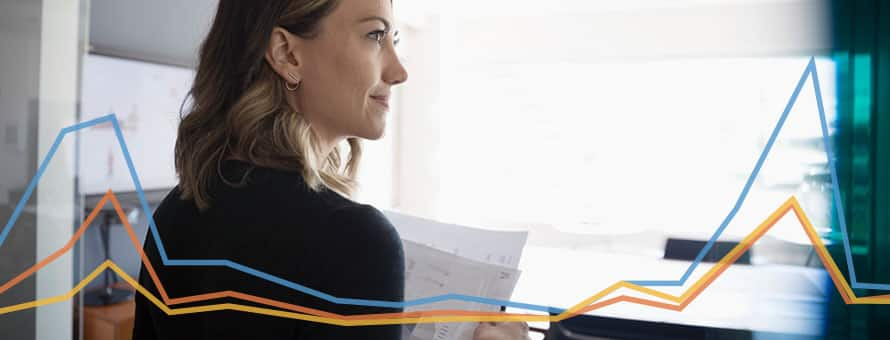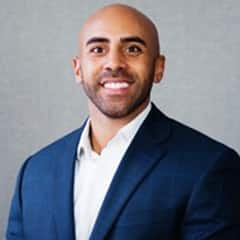What is an Economist? Where They Work and What They Do

Know before you read
At SNHU, we want to make sure you have the information you need to make decisions about your education and your future—no matter where you choose to go to school. That's why our informational articles may reference careers for which we do not offer academic programs, along with salary data for those careers. Cited projections do not guarantee actual salary or job growth.
From local community development offices and financial firms to the Federal Reserve, a wide variety of institutions rely on economists to help make data-driven decisions.
An economist is someone who studies the reasoning behind decisions people make and is interested in using data to boost profits, create better public policy or conduct research.
If becoming an economist interests you, exploring the career, the role it plays in a variety of organizations as well as its growth potential can help you gain more insight into the path.
What Does an Economist Do?
While an economist's job description can vary depending on where you work, according to the U.S. Bureau of Labor Statistics (BLS), economists are often responsible for:
- Advising businesses, governments and individuals on economic topics
- Collecting and analyzing data
- Interpreting and forecasting market trends
- Presenting research results
- Researching economic issues

At its core, the job of an economist is the study of decision-making, according to Sutton Puglia, a regulatory economist and Southern New Hampshire University (SNHU) adjunct faculty member.
“It all comes back to decision-making,” she said. “Economists want to understand why things are happening and why people are making the decisions they do.”
And as an economist, you could really study anything from the cost of products or services to employment levels, business cycles, taxes and inflation, according to BLS.
Where Can an Economist Work?
Whether a small town is trying to attract new businesses or the federal government is working to find solutions to unemployment, economists can help analyze data and make more strategic decisions.
“In pretty much every field, there is going to be a place for economists,” Puglia said.
The government is the largest employer of economists, according to BLS, accounting for a sum total of 52% of employed economists in 2024:
- Federal government - 29%
- State government - 14%
- Local government - 9%
Whether you're in the local, state or federal government, you could work to inform public policy, analyzing how new legislation could impact employment rates, consumer spending and other economic drivers.
Aside from a few years spent in the private sector, Puglia has built her economics career within the government — first at the state level and now within the federal government. At the federal level, she has worked with the U.S. Bureau of Labor Statistics, the Department of Labor and now the Department of Homeland Security.
Economists are also found in consulting and research and development, according to BLS.
Find Your Program
Are Economists Paid Well?
The salary potential in this field is strong.* BLS data shows that in 2024, the median wage for economists was $115,440.* Those working in federal government earned the most on average, with a median salary of $141,590, according to BLS, while economists in state governments earned a median salary of $74,520.*
Job opportunities for economists continue to grow, particularly as the global economy becomes more complex and more businesses see the value of data analysis to boost their profits, according to BLS.* According to 2024 data from BLS, there are projected to be 900 job openings for economists each year.*
How to Become an Economist
If you’re interested in becoming an economist, an advanced college degree is typically required to get your start in the field, according to BLS. The type of job you want, Puglia said, can help determine the degree you’ll need to succeed and the kind of college courses you take.
For local economic development jobs and other entry-level government jobs, Puglia said, a bachelor’s degree in economics is often enough. But for more advanced financial analysis or research work, you might consider a master's degree, such as a Master of Science in Finance. Some positions, BLS said, may require a PhD. (SNHU does not currently offer a PhD in Economics.)
For Nathan McBeath ’20G, it was his advanced degree from SNHU that exposed him to new challenges and prepared him for work beneficial to his career in finance.

As Puglia said, the courses you take during your program can help you learn the skills needed in your career, and for McBeath, this rang true.
He's been able to apply what he's learned in his courses at SNHU to his work. “I frequently deploy learned research and presentation tactics,” McBeath said.
He noted that his instructors gave him the tools to be successful in these courses.
“The professors did a great job of supporting questions and presenting ample opportunities to learn the subject matter,” he said.
Puglia said that students wondering how to become an economist should also consider their career end goal when selecting elective courses during their studies.
If you’re interested in research or policy-making, Puglia said, then psychology and other social science courses would be beneficial. If you’re interested in financial modeling, on the other hand, you’ll need a strong knowledge of statistics, quantitative analysis and mathematics.
Completing an economics internship can give you hands-on experience you can include on your resume — even before you're done with your degree program. Internships also provide networking opportunities and help you develop important skills for the field.
BLS reported that some of the top skills for economists include:
- Analytical skills
- Communication skills
- Computer skills
- Critical thinking skills
- Math skills
“Having analytical capabilities and understanding big data analysis is a strong selling point, especially with the way our economy operates and in today’s job market,” Puglia said. “Economics gives you those skills that you can take and develop in any field.”
Discover more about SNHU’s online master's in finance: Find out what courses you'll take, skills you’ll learn and how to request information about the program.
*Cited job growth projections may not reflect local and/or short-term economic or job conditions and do not guarantee actual job growth. Actual salaries and/or earning potential may be the result of a combination of factors including, but not limited to: years of experience, industry of employment, geographic location, and worker skill.
Danielle Gagnon is a freelance writer focused on higher education. She started her career working as an education reporter for a daily newspaper in New Hampshire, where she reported on local schools and education policy. Gagnon served as the communications manager for a private school in Boston, MA before later starting her freelance writing career. Today, she continues to share her passion for education as a writer for Southern New Hampshire University. Connect with her on LinkedIn.
Explore more content like this article

For Jazzmen Shipp, Earning a Degree Changed Everything

How Kellsie Goodhart-Jones Earned an MBA While Working for the US Air Force

What Jobs Can You Get with a Business Degree?
About Southern New Hampshire University

SNHU is a nonprofit, accredited university with a mission to make high-quality education more accessible and affordable for everyone.
Founded in 1932, and online since 1995, we’ve helped countless students reach their goals with flexible, career-focused programs. Our 300-acre campus in Manchester, NH is home to over 3,000 students, and we serve over 135,000 students online. Visit our about SNHU page to learn more about our mission, accreditations, leadership team, national recognitions and awards.


